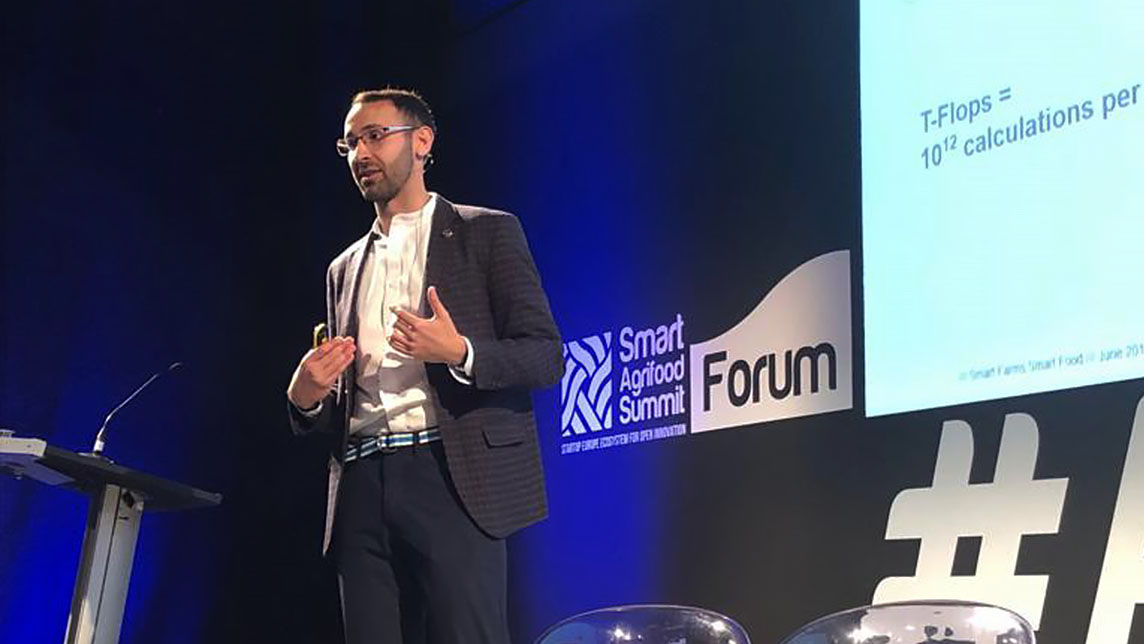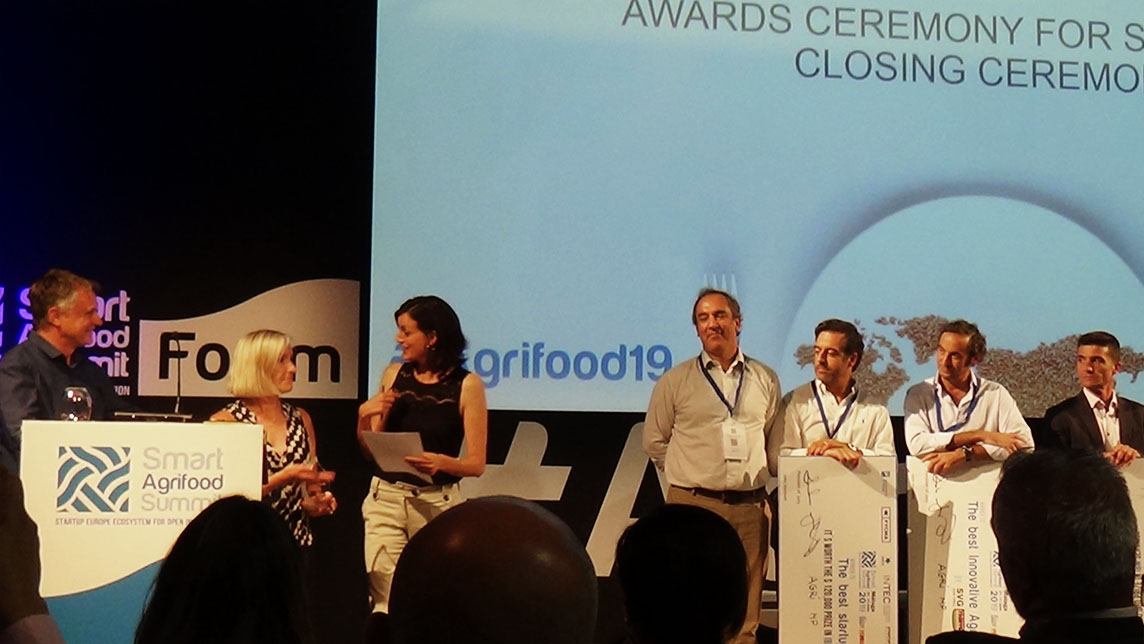Barcelona-based startup Faromatics is preparing to market its smart robot that monitors environmental conditions and animal health in large-scale broiler chicken farms. The hope is that the robot, dubbed ChickenBoy, will help farmers automate routine tasks to improve animal welfare, and thus margins.
Founded in June 2016 by five precision smart farming researchers, Faromatics has developed a roof-suspended, intelligent robot powered by AI that monitors broilers, litter, air quality and equipment round the clock. Deep learning technology is deployed in the service of Faromatics' Digestion Index, which measures the quality of droppings to detect disease in the animals. Farmers access ChickenBoy's information via a secure cloud platform and can set alarms to be alerted automatically of changes in conditions.
The potential of ChickenBoy for improving large-scale poultry farming means Faromatics' solution has already attracted significant attention. The company won the prize for Best Startup worth US$120,000 in IBM services and €2,000 in consulting services from Deloitte at the Smart Agrifood Summit in Malaga in June. It also won the Participant Startup Europea Award – Green Category at Startup Olé 2018, and was also selected as one of 10 startups for the 2018 intake of IQS Next Tech, Spain's only industrial acceleration program.
In an interview with CompassList at the Smart Agrifood Summit, Faromatics CEO and co-founder Heiner Lehr outlined the company's business plan and ambitions.
This interview has been edited for length and clarity.
Q. What inspired you to create Faromatics?
A. I have a Ph.D in Natural Sciences (Physical Chemistry) from the Technische Universität Berlin and I’m specialized in Mechanics. I have been working in the [agriculture and livestock] field for about 10 years. In the founding team, we have people with experience in startups and in acquisitions. We have an international expert in animal welfare who spent 25 years as a director in a German institute working in animal health. The rest of the team are engineers. We all met while working in European researchin charge of creating startups in the field. In the final approach of a European research project, we came to the conclusion that the time was right to make money from precision smart farming.
Why chickens?
I have a lot of experience in chickens and pigs, a bit less in dairy. Chicken farmers are the ones with the best attitude toward the implementation of technology. They understand that they are in the volume business and that small changes to their activity make a big difference at the end of the year. Pig farmers in Europe are a bit less open to innovation. There is some innovation in dairy such as milking robots or collars, but in general [dairy farms] are family-orientated [and operate on a smaller scale] than chickens.
How did you come up with the ChickenBoy solution?
We started with robots running on the ground, but the market rejected the idea. So we decided to hang them from the ceiling. We have had a model running for two years now, but the big challenge is getting everything to work reliably with 20,000 or 40,000 chickens. We are still working on some of issues, especially those to do with low light levels.
What is Faromatics' business model?
Right now we are selling the hardware and the service contract. However, we want to move to a leasing or renting kind of model. So far banks have been ignoring us, but we are starting to get a bit more attention. We are in a Beta phase, so we are testing the robot in different farms across Europe. That is our task for this yearo that we can go commercial late this year or early next year.
What is your target market?
We are targeting what we call integrators. These are vertically integrated companies that supply chicksto the farm. Typically they also supply the feed, and take back the big birds. These are the ones that slaughter and commercialize. They are large and they understand the absolute value of data.
How is the business financed?
There is around €2m invested in the company. The founders put a large amount of money into the company [and] we had an early angel investor. In the last funding round, we raised €1m from strategic corporate investors, like Petro Capital. We expect to launch another financing round, perhaps next year. We are targeting €3m to €4m at a valuation of €10m.
What have been the main difficulties during the startup journey?
Getting the mechanical design was very complicated. We had to go through a litigation process to avoid running into problems later. For the software, the AI part was quite straightforward, but we are still struggling with the image segmentation in certain situations. Installations are crowded – they are like a sea of chickens – so having access to the floor or making the distinction between chickens is not always easy.
Can ChickenBoy interact with the chickens to prevent them from harm, for example?
At the moment, ChickenBoy is observation-only, so it doesn’t interact with the chickens. We are developing other robots that will interact with them, but this one doesn’t. What we are doing is detecting and measuring problems. For example, we exactly see on the map where the chickens die [so we can identify] statistically relevant deaths.
What technologies does the robot use and how does it work?
It is a cloud solution, so the farmer interacts with the cloud. The farmer can set about 30 alarms. He or shecan lead or customize them directly to the smart cloud. Farmers can opt to actively analyze their data or just wait for the alarms.
[The robot has] lots of sensors and cameras. But we do not build hardware, we just assemble it, the components are not ours. It is the software layer that’s of interest.
Who are your competitors?
It is a blue ocean really. There are two main competitors, both French. One is Octopus, which builds ground-based robots that disinfect as they move around the floor, which is called aeration. The other one is Spoutnic, which is for a different production system. Their robot is basically a rumba that goes around, hitting whatever it hits, and creating movement in the room. I call this "chicken jogging," which is actually very helpful, but the robots have no intelligence whatsoever.
What are your goals for the company?
We are already in conversations with producers of around 5bn chickens. That is already 10% of the European market, and we have not yet launched. The interest is amazing. ChickenBoy is our first product and we have three more products in development. I think there is a lot for us to conquer, as the technology bias is basically empty in the agriculture and livestock space.
Are the new products also for poultry farming?
Yes, [but] not necessarily broilers. We will move into pigs eventually, and maybe dairy.












